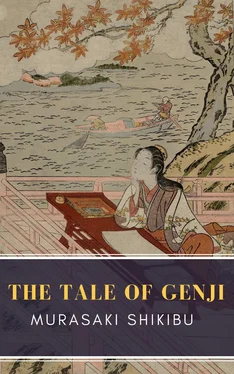Still a guards captain, Genji spent most of his time at the palace, going infrequently to the Sanjō mansion of his father-in-law. The people there feared that he might have been stained by the lavender of Kasugano Though in fact he had an instinctive dislike for the promiscuity he saw all around him, he had a way of sometimes turning against his own better inclinations and causing unhappiness.
The summer rains came, the court was in retreat, and an even longer interval than usual had passed since his last visit to Sanjō. Though the minister and his family were much put out, they spared no effort to make him feel welcome. The minister’s sons were more attentive than to the emperor himself. Genji was on particularly good terms with Tō no Chūjō. They enjoyed music together and more frivolous diversions as well. Tō no Chūjō was of an amorous nature and not at all comfortable in the apartments which his father-in-law, the Minister of the Right, had at great expense provided for him. At Sanjō with his own family, on the other hand, he took very good care of his rooms, and when Genji came and went the two of them were always together. They were a good match for each other in study and at play. Reserve quite disappeared between them.
It had been raining all day. There were fewer courtiers than usual in the royal presence. Back in his own palace quarters, also unusually quiet, Genji pulled a lamp near and sought to while away the time with his books. He had Tō no Chūjō with him. Numerous pieces of colored paper, obviously letters, lay on a shelf. Tō no Chūjō made no attempt to hide his curiosity.
“Well,” said Genji, “there are some I might let you see. But there are some I think it better not to.”
“You miss the point. The ones I want to see are precisely the ones you want to hide. The ordinary ones — I’m not much of a hand at the game, you know, but even I am up to the ordinary give and take. But the ones from ladies who think you are not doing right by them, who sit alone through an evening and wait for you to come — those are the ones I want to see.”
It was not likely that really delicate letters would be left scattered on a shelf, and it may be assumed that the papers treated so carelessly were the less important ones.
“You do have a variety of them,” said Tō no Chūjō, reading the correspondence through piece by piece. This will be from her, and this will be from her, he would say. Sometimes he guessed correctly and sometimes he was far afield, to Genji’s great amusement. Genji was brief with his replies and let out no secrets.
“It is I who should be asking to see your collection. No doubt it is huge. When I have seen it I shall be happy to throw my files open to you.”
“I fear there is nothing that would interest you.” Tō no Chūjō was in a contemplative mood. “It is with women as it is with everything else: the flawless ones are very few indeed. This is a sad fact which I have learned over the years. All manner of women seem presentable enough at first. Little notes, replies to this and that, they all suggest sensibility and cultivation. But when you begin sorting out the really superior ones you find that there are not many who have to be on your list. Each has her little tricks and she makes the most of them, getting in her slights at rivals, so broad sometimes that you almost have to blush. Hidden away by loving parents who build brilliant futures for them, they let word get out of this little talent and that little accomplishment and you are all in a stir. They are young and pretty and amiable and carefree, and in their boredom they begin to pick up a little from their elders, and in the natural course of things they begin to concentrate on one particular hobby and make something of it. A woman tells you all about it and hides the weak points and brings out the strong ones as if they were everything, and you can’t very well call her a liar. So you begin keeping company, and it is always the same. The fact is not up to the advance notices.”
Tō no Chūjō sighed,a sigh clearly based on experience. Some of what he had said, though not all, accorded with Genji’s own experience. “And have you come upon any,” said Genji, smiling, “who would seem to have nothing at all to recommend them?”
“Who would be fool enough to notice such a woman? And in any case, I should imagine that women with no merits are as rare as women with no faults. If a woman is of good family and well taken care of, then the things she is less than proud of are hidden and she gets by well enough. When you come to the middle ranks, each woman has her own little inclinations and there are thousands of ways to separate one from another. And when you come to the lowest — well, who really pays much attention?”
He appeared to know everything. Genji was by now deeply interested.
“You speak of three ranks,” he said, “but is it so easy to make the division? There are well-born ladies who fall in the world and there are people of no background who rise to the higher ranks and build themselves fine houses as if intended for them all along. How would you fit such people into your system?”
At this point two young courtiers, a guards officer and a functionary in the ministry of rites, appeared on the scene, to attend the emperor in his retreat. Both were devotees of the way of love and both were good talkers. Tō no Chūjō, as if he had been waiting for them, invited their views on the question that had just been asked. The discussion progressed, and included a number of rather unconvincing points.
“Those who have just arrived at high position,” said one of the newcomers, “do not attract the same sort of notice as those who were born to it. And those who were born to the highest rank but somehow do not have the right backing — in spirit they may be as proud and noble as ever, but they cannot hide their deficiencies. And so I think that they should both be put in your middle rank.
“There are those whose families are not quite of the highest rank but who go off and work hard in the provinces. They have their place in the world, though there are all sorts of little differences among them. Some of them would belong on anyone’s list. So it is these days. Myself, I would take a woman from a middling family over one who has rank and nothing else. Let us say someone whose father is almost but not quite a councillor. Someone who has a decent enough reputation and comes from a decent enough family and can live in some luxury. Such people can be very pleasant. There is nothing wrong with the household arrangements, and indeed a daughter can sometimes be set out in a way that dazzles you. I can think of several such women it would be hard to find fault with. When they go into court service, they are the ones the unexpected favors have a way of falling on. I have seen cases enough of it, I can tell you.’
Genji smiled. “And so a person should limit himself to girls with money?”
“That does not sound like you,” said Tō no Chūjō.
“When a woman has the highest rank and a spotless reputation,” continued the other, “but something has gone wrong with her upbringing, something is wrong in the way she puts herself forward, you wonder how it can possibly have been allowed to happen. But when all the conditions are right and the girl herself is pretty enough, she is taken for granted. There is no cause for the least surprise. Such ladies are beyond the likes of me, and so I leave them where they are, the highest of the high. There are surprisingly pretty ladies wasting away behind tangles of weeds, and hardly anyone even knows of their existence. The first surprise is hard to forget. There she is, a girl with a fat, sloppy old father and boorish brothers and a house that seems common at best. Off in the women’s rooms is a proud lady who has acquired bits and snatches of this and that. You get wind of them, however small the accomplishments may be, and they take hold of your imagination. She is not the equal of the one who has everything, of course, but she has her charm. She is not easy to pass by.”
Читать дальше












